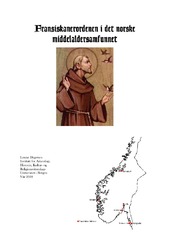| dc.description.abstract | Fransiskanerne var medlemmer av Ordo Fratrum Minorum, "Mindrebrødrenes orden", en katolsk religiøs orden som ble grunnlagt av Frans av Assisi i 1209. Fransiskanerordenen var en populær orden i Europa, med 30 000 medlemmer på begynnelsen av 1300-tallet, og de har blitt tillagt stor betydning for den religiøse og kulturelle utviklingen i middelalderen. Erik Gunnes tilla ordenen liten betydning for det norske middelaldersamfunnet på grunn av de små byene. Denne undersøkelsen tar for seg fransiskanerordenens betydning for det norske middelaldersamfunnet belyst ved fransiskanernes forhold til befolkningen, deres åndelige betydning for den norske befolkningen og tilslutt deres innflytelse på det norske samfunnet. Undersøkelsen har vist at fransiskanerordenen hadde større betydning for det norske middelaldersamfunnet enn det som i tidligere forskning har blitt tillagt ordenen. | en_US |
| dc.description.abstract | This thesis examines the Franciscan order in medieval Norway. Previous historians, primarily Erik Gunnes, have given the order little significance for the Norwegian society in the Middle Ages. Gunnes based his premise on the small size and little importance of the Norwegian cities, since the Franciscan convents were located in the cities, and the Franciscans for the most part made their living there by preaching to the public and receiving alms. This paper examines the order's importance for Norway through three different aspects, first from their interaction with the public (divided into the royal power, secular clergy and the laity), secondly from their spiritual importance (to which degree the Franciscan spirituality had an appeal to Norwegians), and finally, whether their 300 year presence in Norway had an impact on the Norwegian society. This is examined through the Franciscan's political roles granted by the Pope, their role in the sale of indulgences in the late Middle Ages, the different functions of their convents, and lastly, if there was in effect a tangible Franciscan influence on the Norwegian religious culture. My studies have shown that, as well as being influential in urban society, both in religious and secular ways, the Franciscan's influence was not limited to the cities, but spread beyond. By travelling between the convents in Norway, both in order to reach the people outside the cities with their preachings, so called terminatio, and to gather liturgical and literary texts for the theological teachings in the Norwegian convents, the Franciscans came in contact with people outside the cities as well. In addition, their convents, which were used as meeting places by the laity, also attracted people from beyond the urban centers. With their outgoingness and sympathetic attributes, and the laity as their main target for preachings, the Franciscans must have been not only a visible part of the urban society, but must also have had a viable participation with the rural society, which historical evidence suggests. The wills testify that the Franciscan spirituality did in fact appeal to Norwegians; 33 testaments remain that mention the Franciscans. We also have the names of 45 members of the Franciscan order, and some members of the secular Third" Franciscan order. The fact that some of the the testators and members of the order came from the rural districts, further proves that the Franciscans reached people outside the cities. Based on my findings, my thesis repudiates Gunnes' basis for his dismissal of the Franciscan order's influence and importance for the Norwegian medieval society. The size of the Norwegian medieval cities was not decisive for the Franciscans' contact with, and thereby influence on, the Norwegian people and society. Therefore my conclusion is that the Franciscans have had a greater influence on medieval Norway than has been previously suggested by historians. | en_US |
